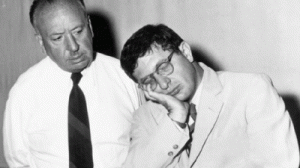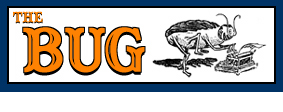 Who was Bernard Herrmann? Well, he was one of the top men in Hollywood for a very long time, a man whose work you’re probably familiar with. See, Herrmann was a composer. He did the scores for so many classic films that it simply boggles the mind. Citizen Kane, The Day the Earth Stood Still, Vertigo, North by Northwest, Taxi Driver. That theme for “The Twilight Zone” you whistle when things get strange? Bernard Herrmann.
Who was Bernard Herrmann? Well, he was one of the top men in Hollywood for a very long time, a man whose work you’re probably familiar with. See, Herrmann was a composer. He did the scores for so many classic films that it simply boggles the mind. Citizen Kane, The Day the Earth Stood Still, Vertigo, North by Northwest, Taxi Driver. That theme for “The Twilight Zone” you whistle when things get strange? Bernard Herrmann.
Every time you take a shower in an out-of-the-way motel on some lonely road trip and you worry about the creepy night manager, why, you’re thinking of Herrmann’s Psycho theme. The guy was trusted to make the music for the films of Orson Welles, Alfred Hitchcock, Francois Truffaut, and Martin Scorsese, big pictures with deep meanings, and he could create a rip-roaring number for a Ray Harryhousen flick or a cheap slasher. Look at Twisted Nerve, totally forgotten today were it not for the fact that Herrmann’s creepy whistling tune was borrowed by Quentin Tarantino (the man knows good music) for the theme of Elle Driver, the maniacal nurse played by Daryl Hannah, in Kill Bill. He even worked in radio, providing incidental music to scare the masses in Welles’ “War of the Worlds.” The man got around.
I’m not a music critic, but I will say that Herrmann’s scores blow my easily blowable mind. The theme from Twisted Nerve is a case in point: though I disliked Kill Bill, and thought much of the music in that movie was grating, that creepy whistle made Daryl Hannah a menacing creature even if her own performance failed miserably. I can only imagine the producer of Nerve crowing to anyone who could listen: “I got Bernard Herrmann!”
He was the son of Russian Jews, immigrants who came to this country seeking a better life, as the old saw goes. His father was an optometrist who encouraged the boy’s love of music. He attended Julliard and palled around with Aaron Copeland and eventually ended up at CBS, where he met Orson Welles. Welles is perceived as a raging egotist, which is true, but he was also a tireless champion of the artists who orbited his little world. Herrmann scored a number of Mercury Theater productions before landing the gig scoring Citizen Kane.
His stature in Hollywood grew and grew and grew. He did work at 20th Century Fox and then began a rich collaboration with Alfred Hitchcock. Vertigo is my favorite of all his works, an amazing package that communicates the psychological upheaval of Scottie Ferguson in perfect synchronization with the images. It’s a great piece to listen to, in its entirety, like you would a Beethoven symphony. As a score, it is perfect. Consider the dream sequence, with the disembodied head of Jimmy Stewart amidst those swirling colors–it wouldn’t work at all without Herrmann’s rich music. I can barely articulate my affection for this score (as I said, I’m no music critic), except to say that the first time I saw the movie I was as impressed by the whole package: Hitchcock’s sure direction, the performances of Stewart, Kim Novak, and Barbara Bel Geddes, the script, and Bernard Herrmann. I was but a teenager but I remember thinking “there’s more than John Williams out there.”
Herrmann was a notoriously difficult personality. There’s lots of stories about his brooding, his loathing of directors who didn’t understand music, and he could rage if he wasn’t given a big enough budget. Sometimes, this worked in his favor. Supposedly he ignored Hitchcock’s desire not to have any music in the famous shower scene in Psycho–Herrmann wrote the score and presented it to Hitch. That score and that scene are perhaps the most iconic moment in any horror film in history.
But Herrmann must have relented at times, at least budget-wise–again, that Twisted Nerve score must have been done on the cheap, as it’s an ultra-low-budget picture. He was a composer who sought the best, put his people through the wringer, and then made even crappy movies into something better. All because of the music.
Bernard Herrimann was born June 29, 1911 and died December 24, 1975.
